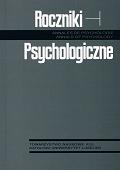Wagi nadawane emocjom pozytywnym o genezie automatycznej vs refleksyjnej a wskaźniki poziomu poczucia szczęścia
The perceived importance of automatic vs. reflective emotions and the level of subjective happiness
Author(s): Dorota Jasielska, Maria JarymowiczSubject(s): Psychology
Published by: Towarzystwo Naukowe KUL & Katolicki Uniwersytet Lubelski Jana Pawła II
Keywords: primary and secondary affects; affective reactions and evaluative judgments; cognitive standards of evaluation; personal goals; subjective happiness
Summary/Abstract: Numerous studies indicate the role of positive emotions in subjective happiness. The diversity of positive emotions leads to the question about the relative importance of emotions of different origin: those evoked automatically (automatic emotions: homeostatic and hedonic) vs. those that arise due to deliberative thinking (reflective emotions: related to self-standards vs. general, axiological concepts of good and evil). The study was based on two assumptions: (1) human happiness depends on the gratification of universal needs; (2) the intensity and quality of happiness depend on the level of perceived importance of reflective emotions, which stem from the fulfillment of axiological standards that determine personal goals. Participants (students of the University of Warsaw; n = 67) were requested to declare their degree of happiness, and then divided into groups with low vs. high levels of happiness (LH vs. HH). Both groups estimated the importance of automatic emotions higher than that of reflective emotions. However, the HH group estimated the reflective emotions significantly higher than the LH group. Participants were also requested to the enumerate personal goals they would like to achieve, and then were divided into two groups: with low vs. high number of enumerated goals (LG vs. HG). The HG group with low estimation of reflective emotions declared the lowest degree of happiness, whereas the HG group with high estimation of reflective emotions declared the highest degree of happiness.
Journal: Roczniki Psychologiczne
- Issue Year: 15/2012
- Issue No: 2
- Page Range: 7-30
- Page Count: 24
- Language: Polish

